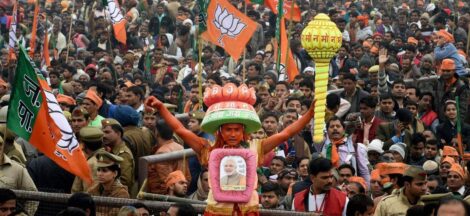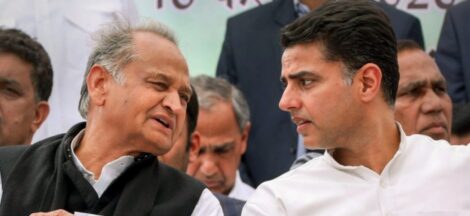By Aditya Aamir
The word ‘compulsory’ doesn’t walk the JNU campus, where a diktat to make attendance compulsory is being fought tooth and nail by students and teachers, both like disciplined soldiers. Yeah, the only thing compulsory about JNU scholars and researchers is ‘compulsive-impulsive’. The irony is Indian Army officers, tied to military traditions, punished if they break rules and regulations, are also awarded degree certificates bearing the JNU watermark.
“Attendance, like compulsory learning, is what (renowned educationist) John Holt called ‘a tyranny and a crime against the human spirit’,” writes JNU Students Union president Geeta Kumari in an article. “Such fiats stem from distrusting the student and overlooking the various life circumstances of the learner. They obstruct rather than facilitate student participation in learning.”
So it has been “civil disobedience” since the winter semester began, say the students, alleging that JNU vice-chancellor Jagadesh Kumar has imposed an “illegal and illogical policy of demanding compulsory attendance of students.”
High-sounding words like “discussion” and “democratic decision-making” are part and parcel of the JNU dialogue these days. The circular to implement the compulsory “decision” was said to have been passed by the Academic Council on December 1, 2017. The students dispute this claim altogether. Despite their aversion to rules and regulations, they have charged the JNU administration with breaking rules and regulations: “The AC meeting never adopted any such “decision” nor was the attendance system even part of the agenda at that meeting.”
The concerned “item no.39 which the JNU administration is citing as proof of its claim, pertains to an issue of CGPA (Cumulative Grade Point Average) hike for BA/MA students of the School of Languages, Literature and Culture Studies – without making any mention of the attendance system,” writes Geeta Kumari. “Students – and teachers – through many innovative ways, are resisting this move by the VC. The JNUTA general body passed a resolution that is worth reading in full, to understand why even the teaching community is so strongly opposed to compulsory attendance.”
It is a “preposterous declaration that henceforth attendance will be compulsory for all categories of students in JNU”, says the JNU Teachers Association, which insists the compulsory diktat will load teachers with a “meaningless form of bureaucratic work that does nothing whatsoever to enhance learning and critical engagement with the subject” and that you cannot expect research scholars to report in every day, “it’s ridiculous”.
The JNUTA General Body refused to “cooperate with this penalty” and asked students and teachers alike to discuss the matter in depth and forward “resolutions” to the JNU administration. Now unlike “compulsory”, “resolution” is a word found in the JNU dictionary. JNU students and teachers pass resolutions like many in the country pass sleepless nights, regularly, thinking of what some JNU students are up to.
And, keeping to strict agitation-tactics, which calls for compulsory manoeuvres, JNU students have started a massive signature campaign against the compulsory attendance move. But when the students went to meet and talk, they allege, the highly undisciplined VC and his administration served disciplinary notices to the union representatives, citing a high court judgment that banned protests within a 100-metre radius at the administration block.
Since then, more than 7,000 students of JNU have collectively and compulsorily boycotted compulsory attendance. Teachers, too, are refusing to mark attendance. “The important thing to note in this conflict is that JNU students just don’t attend classes but they “over-attend” them,” writes Geeta Kumari.
JNU students are free-birds, they walk in and out of classes at whim and fancy. They don’t take “curriculum” seriously. So it is not unbelievable to find a student of French spending more time in German class; a History student walking into a language class to learn Spanish; an English Literature class going on for four or five hours instead of the prescribed two hours. Shucks, there are students demanding extra classes from teachers on topics that are not strictly part of the curriculum!
“This interdisciplinary approach is what makes JNU the university it is. Here, lectures are attended not by compulsion but by the love of and hunger for learning,” asserts Geeta Kumari. “We believe education is best achieved when it is accessible, affordable and there is freedom to pursue it. This is the very reason students in JNU have seen compulsory attendance as regimentation by VC against academic freedom and excellence.”
“Ideas are notice proof,” says a slogan on the wall in JNU. And JNU students and teachers are walking-talking idea-shops. They also believe in freedoms – from freedom of movement to the freedom to shout the “Le Ke Rahenge Azaadi’ slogan in its different avatars depending on the occasion and cause. Many of the JNU students are well-past the age of “students” and it’s impossible to expect them to live to rules imposed on the schoolboy and schoolgirl.
Even “sex” is not taboo in JNU like “compulsory” is. Finding a used condom in the JNU campus is not like discovery a new species of germ in the Chemistry lab. According to a strictly obscurantist politician, with a dirty mind, used condoms are the first discoveries every morning in JNU. And only a once-freewheeling student of JNU – like actor Swara Bhaskar – will have the gumption to attempt to shame a director like Sanjay Leela Bhansali, not a strait-laced Deepika Padukone.
If army officers with a JNU degree can with discipline face anti-tank missiles on the Line of Control, it are also JNU students who oppose battle tanks on the ‘Out of Control’ JNU Square. Leave us alone to our devices, is the JNU slogan. “Yeh Compulsory-Vompulsory Chodo, Hum Leke Rahenge Azaadi!” (IPA Service)


